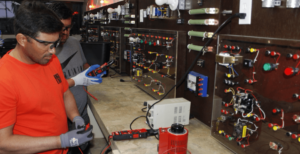If you are going to join an electrician diploma college to become an electrician, it is a good decision. An electrician is a promising career that has many opportunities to grow and excel. After completing your electrical training program, there are two advancement options in this field, like journeyman and master electrician.
Who is a journeyman?
A journeyman is an experienced and trained electrician who works under the general guidance of a master.
Who is a master electrician?
A master electrician is a well-trained and experienced electrician who supervises the work of trainees and journeymen and is responsible for project development and getting permits.
Things to know about a journeyman and master electrician:
Training:
Journeyman- To become a journeyman, you need to undergo a training program and earn a diploma. During your training program, you learn technical skills, get hands-on training, and knowledge about the basic principles and the National Electrical Code.
Master Electrician- To become master electrician, you need to undergo a training program and earn an associate degree. Your training program helps you learn the fundamentals of electricity, project management, building codes, and safety regulations. During your training program, you also gain essential technical skills and hands-on training.
Employment:
Journeyman- There are various employment options for a journeyman, which depend on experience, education, and personal skills. You can work at construction sites, industrial factories, home builders companies, and more. A journeyman is responsible for installing working outlets, fixtures and troubleshooting problems.
Master Electrician- As a master electrician, you get opportunities to handle residential, commercial, and industrial projects. You are responsible for installing the electrical apparatus and systems, maintaining and troubleshooting a wide range of electrical projects, and more. A master electrician can obtain work or project permits and run his own business.
Responsibilities:
Journeyman:
- Handle standard electrician duties, like repairing and installing wires or electrical fixtures
- Manage the installation work for electrical components in walls, ceilings, and floors
- Replace or upgrade older electrical systems
- Install and test electrical appliances
Master Electrician:
- Perform standard electrical duties, like maintaining and installing electrical systems
- Work with general contractors to design electrical plans and blueprints
- Oversee electrical project management at different sites
- Co-ordinate and negotiate with suppliers
- Obtain permits and ensure electrical systems follow current building codes and safety regulations
- Schedule job tasks for apprentice electricians and journeyman
Career Advancement:
Journeyman- A journeyman can earn experience and skills to become a master electrician.
Master Electrician- A master electrician has the potential to become an electrical contractor to run his own business.
Job Outlook for journeyman and master electrician:
Current market statistics and growth shows positive job prospects for both journeyman and master electrician. A survey shows the need for electricians is to grow 13%- 14%, which is much faster than average.
Conclusion:
Becoming a journeyman or master electrician can significantly boost your employment chances and salary potential. If you want to excel in the electrical trade, it is essential to enroll in a training program. You can consider attending an electrician diploma college or trade school to gain technical skills, basic knowledge, and hands-on training.
About the Author:
This article is written by CBT College an electrician diploma college. They provide electrical technician training programs to prepare and help students become competent electricians. Contact them at 786-724-1478 or fill this form https://www.cbt.edu/request-info/ to get more information about their associate degree and diploma electrical training courses!











